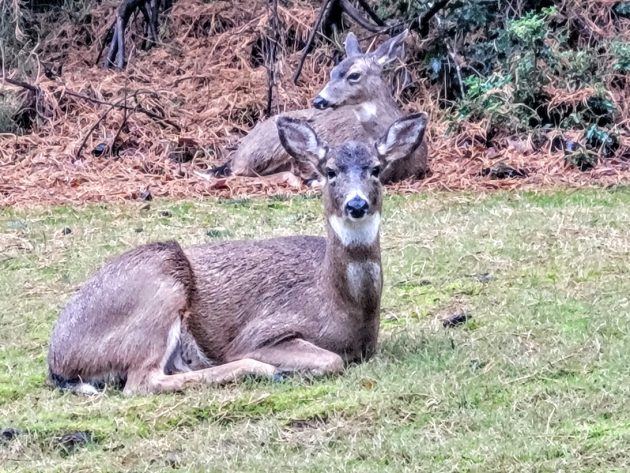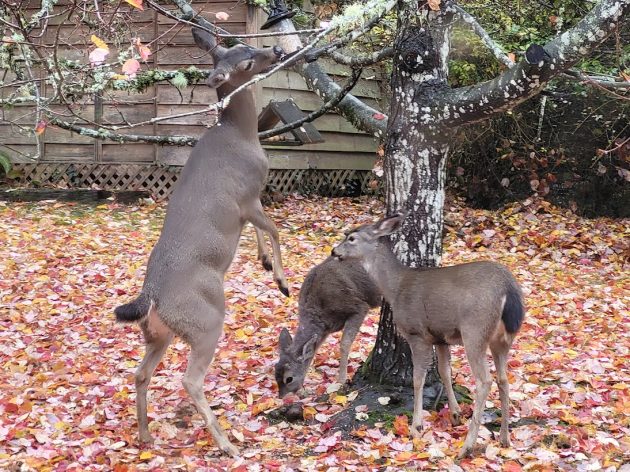
These two were resting in the rain today, just a few feet from my desk inside, where it was dry and the power was back on.
Energy and wildlife — those were two of the unrelated topics that occupied me this December morning, for a while anyway. Let me explain.
The power was out for three hours, from shortly after 7 until just after 10 a.m. Pacific Power reported widespread outages all over the state, caused by high winds and falling trees disrupting lines.
The utility now sends emails telling customers when power is expected to be restored. The message this morning said Pacific hoped this would happen by 2 a.m. tomorrow, a disheartening prospect.
(Also yet another warning against reliance on electricity as our only energy source.)
So it was a great relief to see the lights blink back on so soon. Looks like Pacific Power’s policy is to underpromise and overperform.
Back at my desk and with wi-fi access to the interweb restored, I looked out to see some of our resident deer resting in the rain.
For some time now the taller ones of these deer have been raiding the bird feeders, even though for them it’s a stretch. And the younger ones have vacuumed up what the others spilled.
This worries me. Last year I read that deer can get sick and die if they ingest sunflower seeds, which at the time was all that the birds were getting in their feeders.
I switched to a mixture of ordinary, cheaper bird seed, which has much less sunflower content.
Regardless of the type of seed, though, the Oregon Department of Fish and Wildlife publishes an online sheet with a big fat headline: “DON’T FEED DEER AND ELK.”
Why not? Because feeding the animals attracts them and keeps them coming back, which causes all kinds of problems in populated areas. That’s the main reason. But there’s another reason:
“Each year, ODFW also sees seemingly healthy deer and elk die because they have been fed the wrong food by well intentioned people,” the agency says. “Deliberately feeding deer or elk may inhibit digestion and lead to death by starvation and infection.”
So far, judging by the evidence on the ground around the yard, our regular visitors’ digestion has not suffered. But I’m going to have to find a way to limit their seed intake by moving the feeders.
What’s the solution? In the words of the 1968 western with Clint Eastwood: “Hang ’em High.” (hh)

Higher than this, anyway.


Wasn’t it several years ago that the city council rejected a recommendation from Oregon Fish and Wildlife to criminalize the feeding of wildlife?
It must have been very hard to forgo a new revenue source. But evidently the council did.
A rarity for me to say this, but kudos to them.
Thanks to the overdevelopment in this area, seeing deer is becoming more and more seldom.
Excuse my ignorance, but how does one receive an email if there is no power. Contrary to popular opinion, not everyone has one of them there “fancy phones”. Some of us still rely on land lines due to location.
And thank goodness it isn’t cold like back east. Power outages kill people without electricity. But the Powers that Be (and activists who obviously can’t think that far ahead) have decreed that Natural gas is EVIL and should be banned. Just how do they plan on staying warm without it. And what about the back up generators for many homes and businesses that rely on Natural gas. Hmmmm, guess we’ll just have to do without.
Unless your gas fireplace has a manual “Pilot Light” that you can light with a match/lighter, in the event of a power outage your natural gas furnace will be useless. Initially, it takes electricity to ignite the natural gas. So if your power is out and you can’t get your natural gas furnace to burn, please don’t blame that on Kate Brown and the Democrats. Please pay attention to reality.
Some gas fireplaces can operate, without the blower of course, with a set of double-A batteries when the power is not on.
Pacific Power has a number you can call in event you experience a power outage. This is where you get updates regarding restoration of service. Your landline usually works fine in event of a power outage. Different lines.
Pacific Power outage update number (provides recorded message as I recall):
1-877-508-5088
Really makes you wonder exactly WHO makes these decisions without any forethought as to the ramifications. All seem to be political (or “politically correct”), knee jerk decisions.
I believe ODFS prohibition about feeding wildlife does not mean don’t feed the birds.
Deer are pretty heavier feeders and I doubt that they could eat enough from bird feeders in their lifetime to poison them.
The bird feeders are a target of opportunity that does not satisfy their hunger. They prefer browse that provides a nice mouthful not hors d’ oeuvres which tease the palette.
“My” gas furnace does not require electricity for the pilot light. It does require electricity for the blower. But as mentioned, it can be used with batteries or just as a radiant type of heat. Sure a dang sight better than freezing to death.
Yes, I know about the land line working without power. I just think it is annoying that many companies (my internet provider included) tell you to check their website for updates or get email notifications.
Hartman, reality is that there is not enough electricity now during heat waves and cold snaps. How in the heck do you plan on providing enough for EVERYTHING without an alternative source. Especially now that they think we all need to have electric cars (that most people won’t be able to afford anyway) How are you planning to upgrade everyone’s home so they can charge those cars? Who is to pay for these upgrades? The homeowner? Who is paying for all the charging stations (that we don’t have)? The taxpayer? That is the reality.
Unless and until these things are solved, it is NOT feasible to require all electric everything.
Family moved to Oregon in 1961. We learned to keep a supply of candles and hurricane lamps for lights. The fireplace could warm one room. Learned from a gas company tech how to manually operate the furnace (which had long ago been converted from sawdust).
Lived in a coastal town years later on a river. Electric supply was fragile. Topography channelled the wind. We weren’t too concerned about 60mph steady winds, or even 90 mph gusts.
We dumped the wood stove and put in a gas insert connected to propane. Lit with candles and hurricane lamps. Cooked on the propane grill out back.
The lesson — when the electrickery fails, heating and lighting require another source.
The press to eliminate thermal (gas, oil, coal) as an energy source is admirable, just not practical.
Just remembered an acronymn from another time LTBFITD– let the ba**ards freeze in the dark.
Well, talking about living on the coast in a small town (in the old days), I have a few comments. In the 1950’s, living in a old house in a small town in view of the river on the Oregon coast, it was not unusual to lose electric power during the many coastal storms. The electric outage might go on for days. How did we survive? We had a wood burning fireplace to help keep us warm and we had a wood burning stove along side of our big ole electric stove in the kitchen. We called it a trash burner, but we could burn wood in it and cook our food on the top surface. Of course, we always had lots of candles on hand. What is my point in sharing this of my childhood? It’s that those days and times are gone. Very few people are prepared to survive for very many days without the big E. Electricity. If our electric grid/supply goes down, we are in big do-do. Some may say that wind and solar power may save us all. Being a power lineman for any years, I know that however the electricity is produced, be it hydro, coal, nat gas, wind, solar, geothermal, nuclear, the electricity needs a path (electric power lines) to get from the source to the customer. That path is very vulnerable to both weather and sabotage. Times have changed since the “old days” and I am concerned. That is my 2 cents on the subject.
GregB
Copy all that. Line crews work in nasty conditions to restore service. Thanks
The woman who answered the emergency line at PUD came to recognize my voice. I never got wound, just reported what I saw. Most often was the unsupported 300′ span on the ground. Once was a transformer failure. Once the wires were swinging wildly to the west in windless condition.
In all cases the outage got resolved. The last one required an excavator.
Current place has all utilities underground, which reduces exposure. The electric supply is still overhead and vulnerable.
We have two gas inserts that will light with batteries, the propane grill out back, and the old oil lamps. Can’t undo 60 years of training.